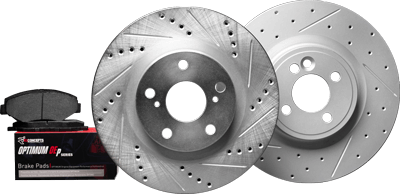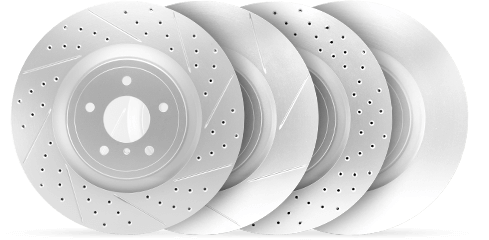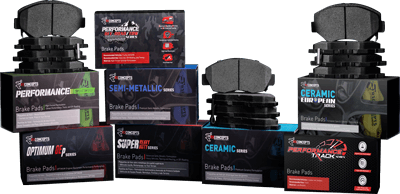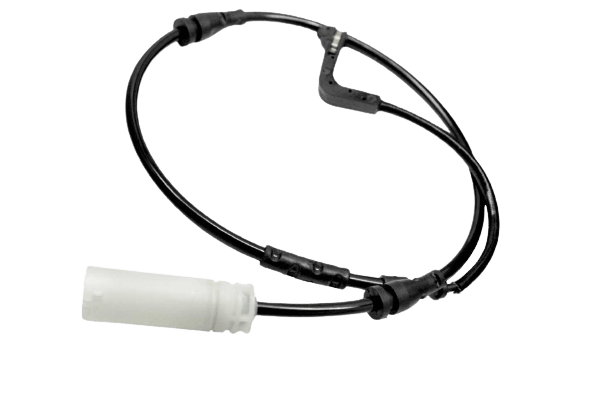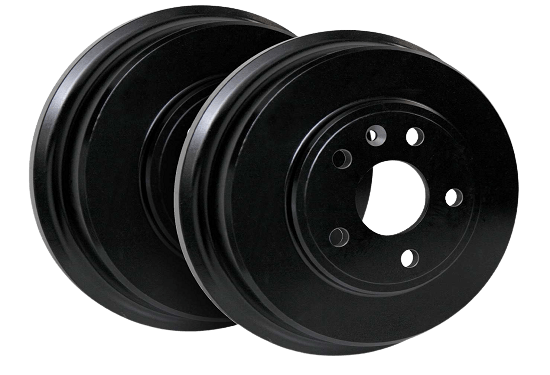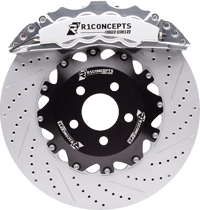Are you wondering why your rotors are rusting? If so, you’re not alone. It’s not uncommon for rotors to rust, and it’s a question many car owners often find themselves asking. The odds of it being unsafe to drive due to rusted rotors largely depends on the severity of the rusting.
In this article, we’ll delve into the causes of rusting rotors and provide practical solutions on how to fix them.
Key Takeaways
Rust on brake rotors is primarily due to material composition, moisture, road salt, heat effects, and lack of use which leads to the initiation and acceleration of the oxidation process.
Preventive measures to avoid rusting include regular maintenance and cleaning, using protective coatings and high-quality rotors, smart parking habits to reduce moisture exposure, and applying rust-inhibiting lubricants.
Rusted rotors can range from surface rust, which is generally not problematic, to deep pitting, which can significantly affect braking performance and may require professional rust removal or rotor replacement.
Causes Of Rusting Rotors

Rust on brake rotors can come from various factors, including heat, humidity, road salt, and the type of rotor material. Another factor is how often you use your vehicle, driving styles and habits can also affect the formation of rust.
To help understand why this occurs more fully, let’s look at some factors about these factors that influence rusting rotors.
Material Composition
The rusting of brake rotors often boils down to their material composition. Brake rotors made of cast iron and steel are more susceptible to rust because they are consist of components that are prone to rapid oxidation.
The mentioned materials are chosen for their durability and heat dissipation characteristics, which are crucial for the functioning of the braking system.
However, these materials have their downside, when steel or cast iron rotors come in contact with moisture sources such as rain, snow, dew and high humidity, it sets the stage for the oxidation process, which is the primary cause of rust. This happens because the metal components of the rotors, particularly iron, react with the oxygen in the water to form iron oxide – the scientific term for rust.
Road Salt Corrosion
Road salt plays a big role in making brake rotors rust. During winter, roads are often salted to melt ice and snow. This salt can stick to your car, including the brake rotors and when the salt meets air moisture, it speeds up the oxidation process of the metal parts in the rotors causing them to rust.
The corrosive nature of salt exacerbates the rusting process, eating away at the metal over time and causing the rotors to degrade faster than they would in a salt-free environment. Regular cleaning and maintenance of the rotors can help to minimize rust and mitigate the damaging effects of road salt, but in areas where road salt is heavily used, rusting of the rotors is an ongoing battle.
Driving Habits And Heat Effects
Your driving habits also play a role in your brake rotor’s condition. Frequent, intense brakes can speed up rotor rusting by damaging their protective layers exposing the metal to moisture and oxygen. While hard braking and stop-and-go driving can also damage it by causing too much heat, weakening the rotor’s protective coating and making them more likely to rust.
Lack of Use
Rusting on the rotors can occur even when a vehicle is not used regularly. This occurs as moisture builds up and combines with iron in the rotor, creating an oxidization process that triggers rust. If left unattended for long periods of time, this corrosion could severely degrade its structural integrity and compromise braking performance. It’s important to monitor your vehicles brake system while they are sitting idle over extended timespans to prevent serious deterioration due to rust buildup from occurring on their rotors!
What are the different types of rust on rotors?

Brake rotors are susceptible to two types of rust:
Surface Rust
This rust, known as surface rust, is a thin layer on the rotor’s surface. It’s not usually a problem, as it can be removed by regular driving or brake use.
Deep Pitting
This is a more serious form of rust that creates deep holes in the rotors. It can greatly impact your brakes and might need to be replaced or get professional service to fix this.
How serious is the rust on my rotors?
The severity of rust on rotors depends on how much rust there is. Surface rust isn’t usually a big deal and can be removed by frequent driving around. However, if the rust has spread and turned into deep pits, this can lead to serious problems that can affect brake performance.
Rotors with deep pits from rust can lead to unusual noises or vibrations when you apply the brakes. It can also trigger early wear and tear on parts and may even cause warping. If your rotors are showing signs of deep rust pits, it’s highly recommended to consult a professional mechanic.
Preventative Measures to Keep Rotors Rust-Free
Regular Maintenance and Cleaning
Maintaining rust-free rotors starts with regular cleaning and maintenance. Ensure that all rotor surfaces are cleaned frequently to prevent the buildup of corrosive materials. This includes not only the visible parts of the rotors, but also the hidden areas that might be prone to rusting. Use a high-quality cleaning solution to remove dirt and grime, and consider using a rust-inhibiting product for an extra layer of protection.
Using High-Quality Rotors

Geo-carbon based coated rotors are less susceptible to rusting and are considered the best option when it comes to brake rotors. These types of rotors offer superior resistance to rust, ensuring your braking system remains efficient and reliable for longer.
Cheap, old school rotors might save you money in the short term, but they are often more susceptible to rusting and can lead to more costly repairs down the line.
Applying Protective Coatings
Applying a protective coating can help prevent rust. These coatings stop the rotors’ metal from reacting with the environment, slowing down rusting. There are many types of coatings out there, so you can choose the right one for your needs.
Smart Parking Habits
Where you park your vehicle can also have a big impact on the likelihood of your rotors rusting. If possible, try to park your vehicle in a covered area, such as a garage or carport. This can help to protect your rotors from exposure to rain, snow, and other sources of moisture that can accelerate the rusting process.
Using Anti-Rust Lubricants
Anti-rust lubricants can be extremely useful to prevent rusting or at least slow the oxidation of your brake rotor. They can be applied to rotors to lower the friction that may cause rusting. Additionally, they form a protective shield that helps keep moisture and corrosive substances from reaching the rotor surface.
Resurfacing Rotors

Resurfacing rotors can help prevent rust. This method removes a small layer from the rotor’s surface, getting rid of any existing rust and revealing a fresh metal layer. This new layer is less likely to rust, especially if you apply a protective coating or rust-inhibiting lubricant afterwards. Plus, resurfacing can improve the rotor’s performance by smoothing out any rough spots caused by rusting.
Can I Remove Rust from My Rotors Myself?
Yes, you can remove rust from your rotors yourself. This can be done using techniques such as scrubbing with steel wool or sandpaper, and applying rust-inhibiting lubricants.
However, for severe rust damage, professional rust removal or replacing your rotors may be necessary.
How Much Is A Professional Rust Removal Cost?

When rust damage to the rotors is too severe for DIY methods, professional rust removal may be necessary. Costs can range from $100 – $300 depending on how much work needs doing and what type of process has to take place.
Summary
Rusting brake rotors is a common problem car owners have to deal with. It can be caused by several things, like the type of metal used for these pieces, exposure to moisture buildup or road salt and even excess heat build-up from braking. This article explains what rust types may form on your rotors as well as how potentially damaging it could be when neglected.
Car owners should take preventive steps such as timely maintenance checks and cleaning off debris along with coating protection, applying quality rotor components so they don’t corrode easily plus smart parking habits that limit contact between brakes and wet surfaces etc., using lubricants which impede formation of rust Sometimes resurfacing/replacing existing ones if required instead of opting DIY technique in case only minor discoloration exists – more intensive methods are better done by specialists when brake discs are severely affected by corrosion
Frequently Asked Questions
Is It Safe To Drive With Rusty Brake Rotors?
It depends on the severity of the rust. Surface rust is generally not a problem and can be removed by regular driving or brake use. However, deep pitting caused by rust can significantly affect your brakes’ performance and may even be dangerous. If you notice significant rust or any changes in your brakes’ performance, it’s recommended to consult a professional mechanic.
If only one rotor is rusty, should I replace both?
It’s generally recommended to replace both rotors at the same time, even if only one is rusty. This is because uneven wear and tear can affect your vehicle’s balance and braking performance. However, if the rust on one rotor is only surface level and can be easily removed, replacing both might not be necessary. Always consult with a professional mechanic to ensure the safety and proper functioning of your vehicle’s braking system.
How Long Do Brake Rotors Last Before Rusting Becomes an Issue?
The lifespan of brake rotors before rusting becomes an issue can vary greatly depending on factors such as the quality of the rotor, the climate, and how often the vehicle is used. However, generally speaking, brake rotors can last anywhere from 30,000 to 70,000 miles before rusting becomes a significant issue. It’s important to remember that regular maintenance and proper care can help extend the life of your rotors and delay the onset of rust.


